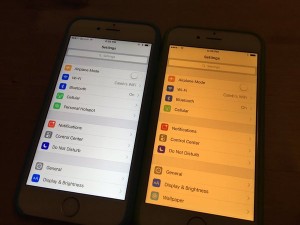Does the new Night Shift technology offered by Apple significantly effect blue light over-exposure?
by Matthew Clagg
In the wake of recent research about the effects of overexposure to blue light and the disruption it causes to circadian rhythm and the human body’s’ energy production, technology companies have responded with software that reduces the amount of blue light emitted by screens – or so they claim. The splashiest release came recently with Apple’s highly anticipated iOS 9.3 update, released March 23, with a technology called Night Shift. While some consumers are positive about the technology, which does reduce screen brightness and make iPhones easier to look at late at night, experts remain unconvinced of the touted benefits.
Fr
om Forbes* “…Night Shift has also come under attack from none other than Ray Soneira, president of DisplayMate –
a site which has become the industry benchmark for testing the displays of electronic devices and is often cited by manufacturers in their marketing materials. Soneira dismisses the implementation of Night Shift in iOS 9.3 saying it does little to no good. He argues:‘Night Shift, which turns down the amount of blue light produced by the display, won’t significantly affect the production of melatonin enough to influence the circadian rhythm and improve the user’s nighttime sleep cycle. I’ve looked into this before and it’s more of a placebo effect.’”
Another point researchers present is that a true reduction of blue light from the harmful spectrum should turn the display color to yellow, but Apple’s Nightshift turns the display to an amber color. Android based apps BlueLight Filter and Twilight turn the display to dominantly gray or red, respectively. At this point, no experts in the field of sleep science or blue light study finds any of the technology to be significantly beneficial, perhaps in large part because the core problem goes beyond the phone.
The core issue is this – while nighttime smartphone use does contribute to interrupted sleep cycles, blue light is present in many more sources that just iPhones and iPads, and overexposure occurs throughout day, not just right before bed. Fluorescent lights, television, laptop and desktop screens, and even the sun itself all contribute to the overly high levels of blue light now absorbed by human eyes. So how far does an orange-tinted iPhone screen go to address the blue light epidemic? Not very.
The good news is that awareness of blue light exposure is on the rise, making now a better time than ever before to equip patients with a real solution – blue light blocking lenses and coatings.
From Somnilight** “Luckily, many of these hazards have been traced to a single, correctable problem: melatonin deficiency. According to numerous studies, blue blocking glasses may hold the key to correcting dangerous melatonin deficiencies and ameliorating these troubling health trends.”
Many blue light blocking lens coatings exist on the market, but the coatings warp color, cause distortion, and tend to break down over time. Still, coatings are often more desirable by patients than lenses with blue light blocker within the lens material itself, which have the same disadvantage of Apple’s night shift in the very noticeable yellow discoloration in the lens itself and the field of view.
But there is a solution. The highest performing lens on the market today with the least amount of color distortion is the VITARIS™ lens, which blocks up to 95% of HEV light (measured to 420nm), tops the competition without sacrificing clarity. This is the VCD Labs lens of choice, as we remain dedicated to providing only the highest quality, truly beneficial goods for our doctors and their patients. For more information on Vitaris lenses and how they can benefit your computer-using patients, visit vcdlabs.com/vitaris.
Sources:
*Forbes Article: http://www.forbes.com/sites/gordonkelly/2016/03/23/apple-ios-9-3-night-shift-problems/#55a41a4a2998
**Shift Work Disorder http://www.somnilight.com/night-shift-workers-melatonin-and-health.html


Comments 2
would like to talk with Matthew about blue light blocking devices
Author
Hi Dennis! Happy to talk with you. What’s your question? You can email me at matthew.clagg@visioncaredirect.com